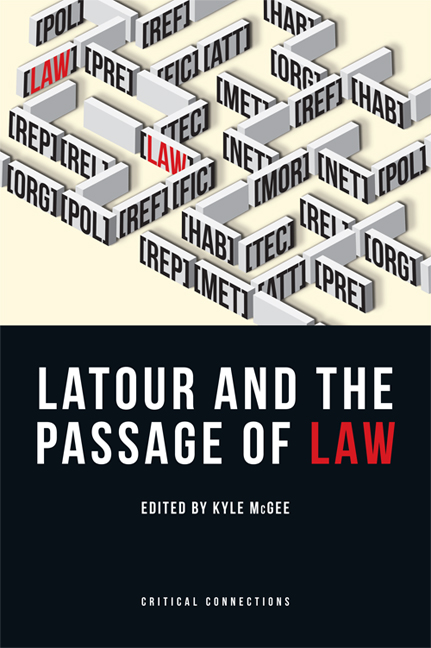Book contents
- Frontmatter
- Contents
- Introduction
- 1 From the Conseil d’État to Gaia: Bruno Latour on Law, Surfaces and Depth
- 2 Politics and Law as Latourian Modes of Existence
- 3 On Devices and Logics of Legal Sense: Toward Socio-technical Legal Analysis
- 4 ‘The Crown Wears Many Hats’: Canadian Aboriginal Law and the Black-boxing of Empire
- 5 Providing the Missing Link: Law after Latour's Passage
- 6 The Life and Deaths of a Dispute: An Inquiry into Matters of Law
- 7 Plasma! Notes on Bruno Latour's Metaphysics of Law
- 8 The Conditions of a Good Judgment: From Law to Internal Affairs Police Investigations
- 9 In The Name of the Law: Ventriloquism and Juridical Matters
- 10 Laboratory Life and the Economics of Science in Law
- 11 Bartleby, Barbarians and the Legality of Literature
- 12 The Strange Entanglement of Jurimorphs
- List of Contributors
- Index
3 - On Devices and Logics of Legal Sense: Toward Socio-technical Legal Analysis
Published online by Cambridge University Press: 05 September 2016
- Frontmatter
- Contents
- Introduction
- 1 From the Conseil d’État to Gaia: Bruno Latour on Law, Surfaces and Depth
- 2 Politics and Law as Latourian Modes of Existence
- 3 On Devices and Logics of Legal Sense: Toward Socio-technical Legal Analysis
- 4 ‘The Crown Wears Many Hats’: Canadian Aboriginal Law and the Black-boxing of Empire
- 5 Providing the Missing Link: Law after Latour's Passage
- 6 The Life and Deaths of a Dispute: An Inquiry into Matters of Law
- 7 Plasma! Notes on Bruno Latour's Metaphysics of Law
- 8 The Conditions of a Good Judgment: From Law to Internal Affairs Police Investigations
- 9 In The Name of the Law: Ventriloquism and Juridical Matters
- 10 Laboratory Life and the Economics of Science in Law
- 11 Bartleby, Barbarians and the Legality of Literature
- 12 The Strange Entanglement of Jurimorphs
- List of Contributors
- Index
Summary
The problem with black-boxing rules
The production of legal statements is a peripheral concern among socio-legal scholars, philosophers, anthropologists, critical theorists and others engaging law from what, according to a conventional doctrinal perspective organised around the artifact of the legal rule, is itself a peripheral vantage point. Perhaps this is as it should be. This chapter suggests otherwise.
Perhaps, by moving beyond the matrix in which legal statements are assembled in order to access such complex but relatively common phenomena as variances in legal effect and enforcement, or the work of legal rules and modes of reasoning in the construction of social attributes (such as class, race, gender) or other broad topoi of the socio-legal, scholarship disserves its very object of study. Perhaps it even neutralises the force of its own argumentation: having eclipsed the entire scenography in which the legal artifact under scrutiny came to be, is it not plausible that diagnoses, recommendations and critiques will serve in the last analysis only to entrench a problematic mode of legal production? By starting from (what is understood as) a refined, stable legal rule or set of rules and proceeding to an examination of its empirical interpretation or its appearance in patterns of legal activity, by making it pass, unaltered, through diverse social channels, does the analyst not render the rule more opaque, even as she sheds light on its failures and achievements? In doing so, socio-legal studies makes itself parasitic on doctrinal analysis: quite different, to be sure, but committed all the same to the integrity of the law's black boxes and performatively complicit in the macro-structuring of a particular normative world – often strikingly similar to the one purportedly critiqued.
This failure of legal studies is basic and spread widely beyond the field, in virtually every domain for which rules, standards, principles and other normative artifacts are endowed with quasispiritual powers to regulate, restrict, govern, dominate or rule quite effortlessly. It is a metaphysical failure. Thought and speech, things and practices alike are delocalised so that their normative effects become untraceable and emanate, somewhat mysteriously, from no particular site or act of enunciation. Unbound from such terrestrial constraints, disembedded legal particles move swiftly through the normative void.
- Type
- Chapter
- Information
- Latour and the Passage of Law , pp. 61 - 92Publisher: Edinburgh University PressPrint publication year: 2015



